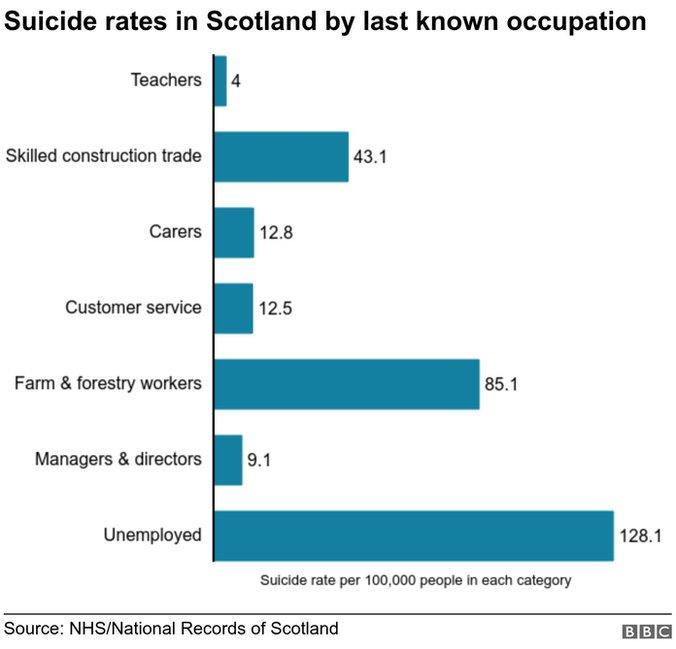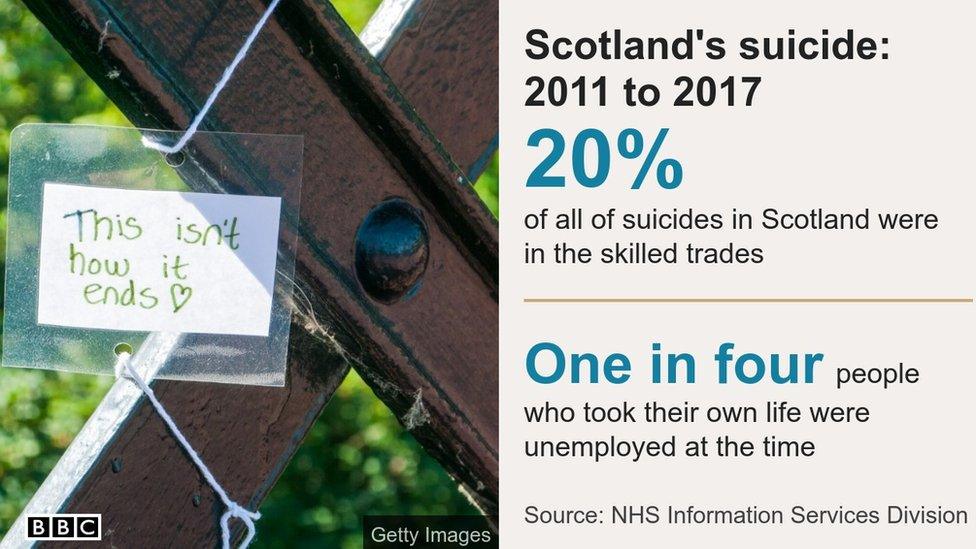The men most at risk from suicide in Scotland
- Published

The type of job somebody does is a big factor in the risk of suicide, figures released to BBC Scotland show.
A breakdown of National Records of Scotland (NRS) data has revealed that male-dominated jobs, such as farm workers or tradesmen, have a higher suicide rate than other occupations.
However, it is unemployed people who represent the biggest category of those taking their own lives.
The number of suicides in Scotland increased by 15% last year.
This hike came after a decline in the suicide rate over the previous decade.
The NHS publishes annual figures, using information from NRS death records, on suicides in Scotland and it has consistently shown men are markedly more likely to take their own lives than women.
Using freedom of information laws, BBC Scotland obtained a breakdown of suicide deaths by last known job.
Between 2011 and 2017, the data shows 1,211 of the 4,661 suicides were by people who were unemployed.
Of those who were working, the most affected are in the "elementary trades and related occupations" which primarily covers farm, forestry and fisheries workers - where people are seven times more likely to have died from suicide than those in customer service roles.
Other areas where the rate is high is skilled construction trades - where the suicide rate of 43.1 deaths per 100,000 workers is 10 times that of teachers.

Billy Watson, chief executive of mental health charity SAMH, said it was time to "redouble our efforts" to tackle suicide rates.
He added: "We need to better understand the risk factors associated with suicide.
"These figures show us that those employed in skilled trades are at a higher risk of suicide, along with those who are unemployed.
"While there's compelling evidence to show a positive link between employment and mental health, this highlights that employers have a responsibility to create a culture that is open in talking about mental health and which challenges discriminatory behaviour."

The jobs data released to BBC Scotland shows that 904 of the 4,661 suicides in Scotland between 2011 and 2017 were in the skilled trades such as construction or engineering.
Gary Macdonald, who helped to set up the Mind the Men peer support group in Glasgow in memory of his cousin Grant, an electrician who died from suicide, said he was not surprised by the figures.
He said: "What has been interesting is the range of people who come through the door. We get everyone, rich and poor - mental health problems don't care how money you have in your wallet.
"A lot of them might work in places with a lot of other guys where it is not just the done thing to talk about your feelings so we have guys come to us who have not discussed their feelings for decades."
Reducing suicides
Scotland has had a higher recorded suicide rate than the UK as a whole since the early 1990s, although this may be due to the variation in recording practices.
The Scottish government published its suicide prevention action plan , externalin August last year and a National Suicide Prevention Leadership Group has been tasked with helping to implement the plan.
Ministers want to reduce Scotland's rate of suicide by 20% by 2022 - using the 2017 rate as the baseline.


Information and advice
If you or someone you know is struggling with issues raised by this story, find support through BBC Action Line.
- Published10 September 2019

- Published26 June 2019
